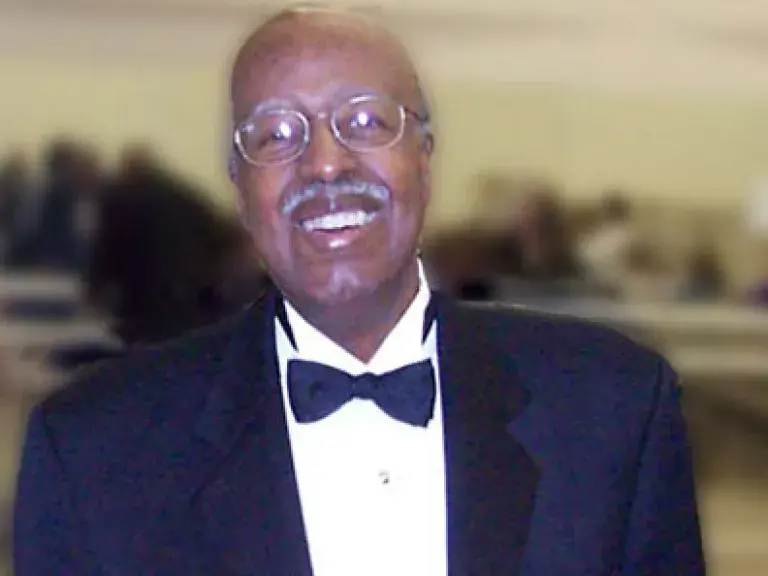
Sixty years ago Brazeal Dennard stood up before the Angelic Choir of the Peoples Baptist Church in Detroit for the first time as its conductor. Dennard was just 17, but he was ready.
Growing up in the church, Dennard had accompanied his mother to rehearsals and observed the fervor with which Mrs. Johnnie Reid—the church's organist and choir director, and his first piano teacher—taught the spirituals that so ignited the passions of her singers.
His next piano teacher, Robert Nolan, then dean of the Robert Nolan School of Music, was inspirational—but also technically demanding. "He was insistent that you be well prepared to play what you're supposed to play, learn how to transpose it up, learn how to transpose it down, and sight-sing," Dennard recalls. "When you went to piano lessons, you came away with a complete music lesson."
Nolan also let Dennard and other promising students take turns doing sectional rehearsals and conducting the Robert Nolan Choir. As Dennard approached his senior year of high school, he waited for Nolan to tell him where he should go to continue his music studies.
Nolan told him to stay in town. "There is something here for you," Nolan told him. "I don't know what it is. But I have a gut feeling that there is something very special for you here and I think you should stay."
"I was very, very disappointed because I was looking forward to going away," Dennard recalled. "But, I thought Mr. Nolan was God. So I ended up staying here."
It was a good choice for Dennard and a lucky one for Detroit and for the larger world of choral music. He earned a masters degree in music education at Wayne State University. Leading the church choir and then various award-winning choirs and ensembles in the Detroit Public Schools, Dennard chafed at the label music director or even music educator. "I am a musician," he says. "I took an average church choir and simply gave them vocal techniques. They had been exposed to enough music in school to pick up from this, and it worked. I still use all those techniques in rehearsal that I learned in voice lessons."
Soon the church choir was singing cantatas and oratorios such as The Seven Last Words of Christ by Theodore DuBois, the Christmas Oratorio of Camille Saint-Saens, Beethoven's Mount of Olives, Mendelssohn's Elijah, and Handel's Messiah. Dennard hired members of the Detroit Symphony Orchestra to perform with them.
In 1972, Dennard took a nucleus of singers from the church choir and formed the Brazeal Dennard Chorale. In a city with a number of professional choruses, Dennard's group had tough competition. But the diversity of their repertoire helped keep them together, he said. The Chorale sings the full range, from oratorios with the Detroit Symphony such as Haydn's Creation and Beethoven's Ninth Symphony, to the works of black composers, many of which Dennard discovered through his association with the National Association of Negro Musicians.
In particular, Dennard has become a champion of the Negro spiritual. "Those are songs that affected my early life," he says. "They really gave me a sense of what religion is through music. It gave me the staying power that I needed. When I was in heated battles I would recall the texts of some of the spirituals."
One of those battles came in 1968, a year after Detroit's devastating race riots. The Detroit Symphony wanted to put on a free community concert in the open air and asked Dennard to find a black soloist. Dennard complied but later wrote a letter to the Symphony saying that he would like to establish a series that showcased music by black composers with a black conductor—inside the concert hall, not outside.
Thus began the Orchestra's annual Classical Roots Concerts celebrating African-American musicians and composers—and a fruitful collaboration between the Chorale and the Detroit Symphony. "The pieces that we have brought to them have opened their eyes to the diverse material that we have," says Dennard.
On that first program in 1978 was a piece by African-American composer Adolphus Hailstork, "Done Made My Vow," based on the texts of the Rev. Martin Luther King, Jr. It is the same piece that Dennard chose for the focus of the concert last summer in Orchestra Hall celebrating his 60 years as a conductor in Detroit. The words guide him and inspire him as he looks to future challenges:
Done made my vow to the Lord. I will go, I shall go, to see what the end will be.
This article is adapted from The Voice, Fall 2007. It is based on an interview with Brazeal Dennard by David Morrow, associate professor and director of the Glee Club at Morehouse College in Atlanta, and was prepared for publication by Kelsey Menehan.

